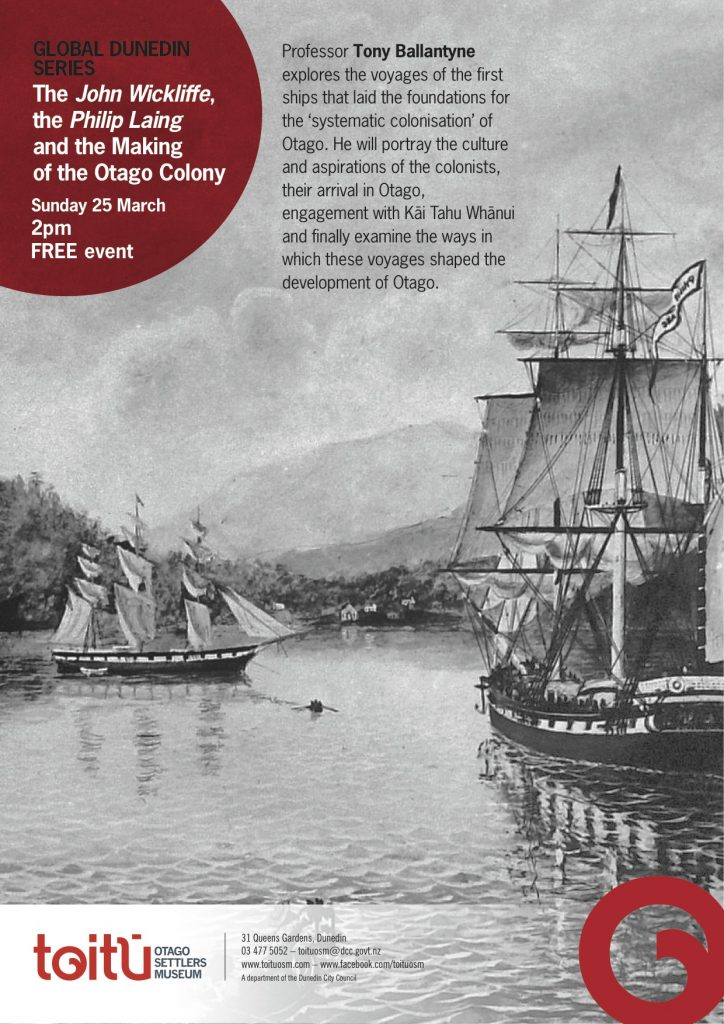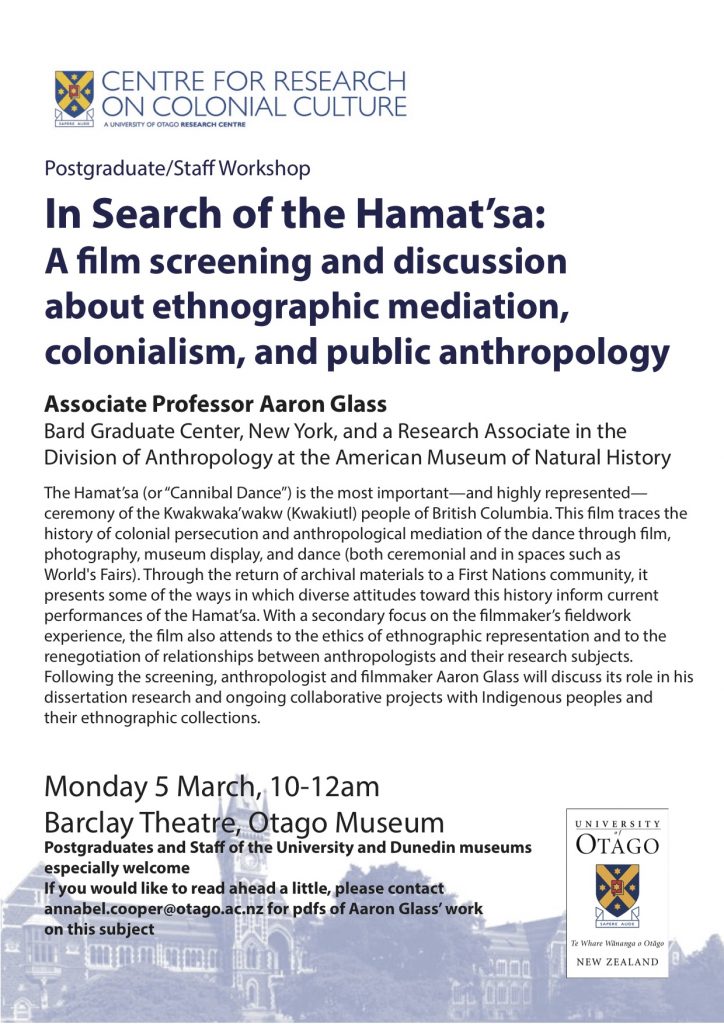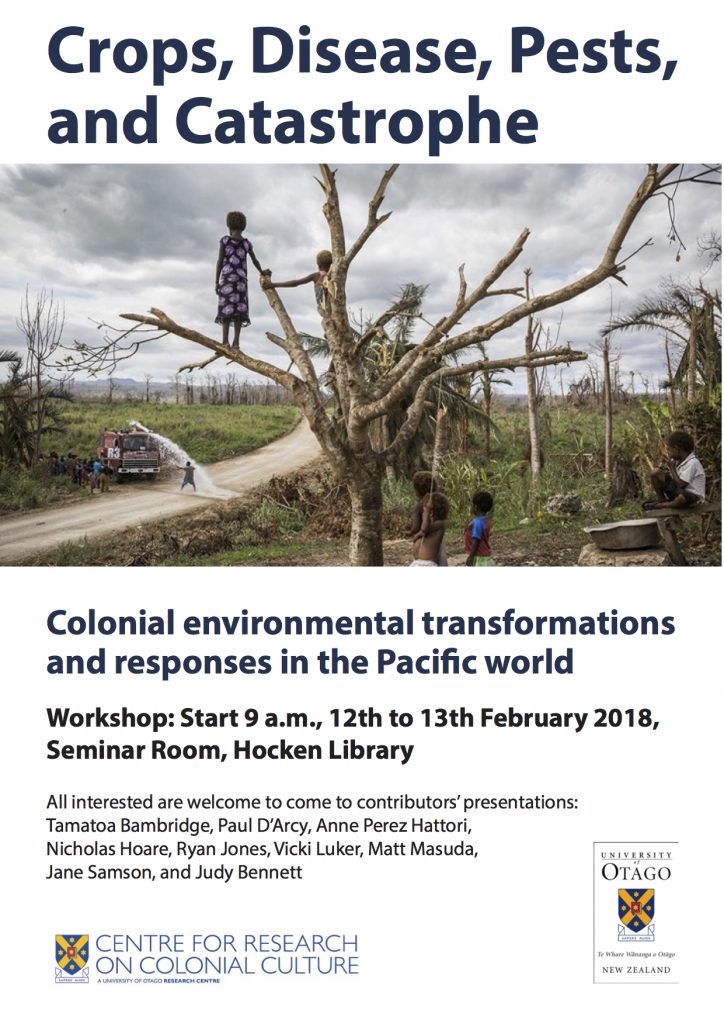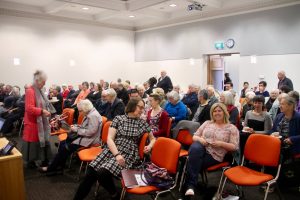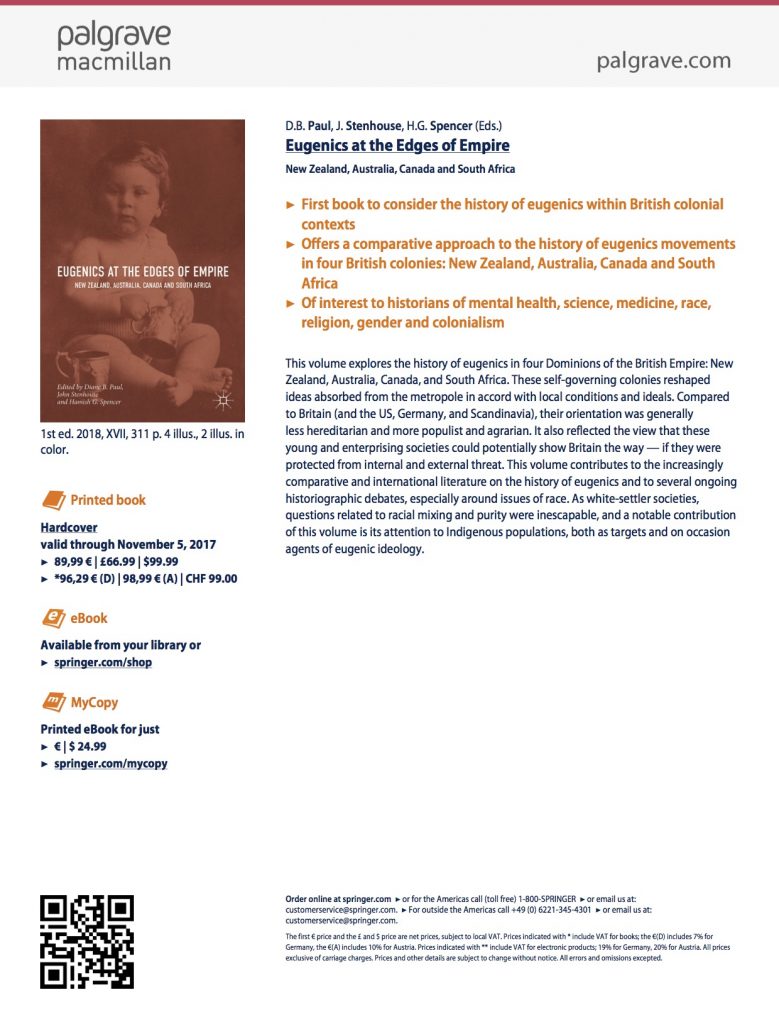Centre News and Forthcoming Events
The Centre has had a busy start to 2018. We opened the year with an international symposium, co-convened by Judy Bennett (Otago) and Paul D’Arcy (ANU) on ‘Colonial Environmental Transformations and responses in the Pacific World: Crops, Disease, Pests, and catastrophe’, held at the Hocken in mid-February. Across two days we were privileged to hear from scholars working at the cutting-edge of Pacific environmental history. Papers touched on long-distance animal migrations, agricultural transformations, the politics of phosphate mining in French Oceania, climate change, genetic modification, and the impacts of major health events on indigenous communities, notably the influenza pandemic in Guam. Many thanks to the organisers for putting together such an exciting programme and to the presenters for sharing their work: Vicki Luker, Tamatoa Bambridge, Ryan Tucker Jones, Jane Samson, Matt K. Matsuda, Nicholas Hoare, and Anne Perez Hattori. We look forward to seeing the papers emerge in published form in the near future.
In February and early March the Centre had the pleasure of hosting a visiting scholar, Associate Professor Aaron Glass from Bard Graduate Center, New York. While in Dunedin Aaron presented on his digital humanities project as part of a well-attended open seminar with Associate Professor Conal McCarthy (Victoria University of Wellington) concerned with digital collections, museums and indigenous futures. Aaron also presented a workshop at Otago Museum on public anthropology and visited Te Papa Tongarewa where he also shared his research. Many thanks to the team at Te Papa, particularly Bronwyn Labrum, for making Aaron’s visit possible.
A number of events planned for the remainder of 2018 including an international workshop on new histories of whaling in the Pacific (at the University of Hawai’i-Manoa) in late June, and symposia on rural history and indigenous writing in November.
Throughout 2018 the Centre is sponsoring the Global Dunedin public lectures at Toitū Otago Settlers Museum. This is a monthly series of free talks running from March to October and we have a great line-up of speakers including Charlotte Macdonald (Victoria University of Wellington), Jill Haley (Canterbury Museum) and Kate Bagnall (University of Wollongong) along with many others. The series kicks off on 25 March with a talk by Centre co-director, Professor Tony Ballantyne (see poster). All are welcome!
Reminder: Film Screening and Workshop
A reminder that the Centre is sponsoring a film screening and workshop on 5 March. It starts at 10am and takes place at the Barclay Theatre, Otago Museum. All are welcome.
Film screening and workshop
During his visit to the University of Otago, Associate Professor Aaron Glass (Bard Graduate Center, New York) will lead a workshop discussing his engagement in film as part of critical anthropology, the ethics of ethnographic representation, and collaborative research. All welcome. Details are below.
Museums, Digital Collections and Indigenous Futures Talks
All are welcome to attend an open seminar on Thursday 22 February featuring two scholars who will speak about their current projects that aim to reconnect indigenous communities with objects and archives, making them available for future use and reinterpretation.
Location: Moot Court, 10th Floor, Richardson Building, starting at 10am
Associate Professor Aaron Glass (Bard Graduate Center, New York) will discuss his involvement in producing a new critical edition of anthropologist Franz Boas’s 1897 landmark book, The Social Organization and Secret Societies of the Kwakiutl Indians, which uses digital media to link museums, archives and communities while recuperating ethnographic records for current and future use. Not only did the volume make draw upon existing museum collections from around the world, Boas and his indigenous collaborator, George Hunt, left a vast archive of unpublished materials relevant to the creation and afterlife of the 1897 text, including hundreds of pages of Hunt’s corrections and amendments. An international and collaborative endeavour to create a new annotated critical edition of the book – both in print and in digital formats – unites published and unpublished materials with current Kwakwaka’wakw knowledge. This presentation discusses that project and presents an interactive prototype for the digital edition that re-embeds ethnographic knowledge within Indigenous epistemological frameworks and hereditary protocols for access.
Associate Professor Conal McCarthy (Victoria University of Wellington) will outline two current trends in museum research in Australia and Aotearoa: one looking back to the history of collections, ethnology and colonisation, and the other looking forward to digital technology, co-curating and an emerging indigenous Museology. It will briefly introduce various projects which aim to reconnect tribal descendants to ancestral heritage through digital tools which enable the reassembly of scattered records, material culture and images. It will introduce the Marsden-funed project ‘Te Ao Hou: Imagining Worlds in New Zealand, 1900-1950’ led by Anne Salmond at Auckland University, which follows Māori leaders Apirana Ngata and Peter Buck through their involvement in the Dominion Museum ethnological expeditions, the Polynesian Society and the Board of Māori Ethnological Research. It considers the mobilising of relational concepts such as whakaapa/kinship, which were applied in Buck and Ngata’s ‘practical anthropology’, and the lessons of their experiments for both Māori museum practice today and contemporary tribal development generally.
Open Seminar: Museums, Digital Collections and Indigenous Futures
On 22 February the Centre is hosting an open seminar featuring two scholars who will speak about their current projects that aim to reconnect indigenous communities with objects and archives, making them available for future use and reinterpretation.
Location: Moot Court, 10th Floor, Richardson Building
All welcome.
Associate Professor Aaron Glass (Bard Graduate Center, New York) will discuss his involvement in producing a new critical edition of anthropologist Franz Boas’s 1897 landmark book, The Social Organization and Secret Societies of the Kwakiutl Indians, which uses digital media to link museums, archives and communities while recuperating ethnographic records for current and future use. Not only did the volume make draw upon existing museum collections from around the world, Boas and his indigenous collaborator, George Hunt, left a vast archive of unpublished materials relevant to the creation and afterlife of the 1897 text, including hundreds of pages of Hunt’s corrections and amendments. An international and collaborative endeavour to create a new annotated critical edition of the book – both in print and in digital formats – unites published and unpublished materials with current Kwakwaka’wakw knowledge. This presentation discusses that project and presents an interactive prototype for the digital edition that re-embeds ethnographic knowledge within Indigenous epistemological frameworks and hereditary protocols for access.
Associate Professor Conal McCarthy (Victoria University of Wellington) will outline two current trends in museum research in Australia and Aotearoa: one looking back to the history of collections, ethnology and colonisation, and the other looking forward to digital technology, co-curating and an emerging indigenous Museology. It will briefly introduce various projects which aim to reconnect tribal descendants to ancestral heritage through digital tools which enable the reassembly of scattered records, material culture and images. It will introduce the Marsden-funed project ‘Te Ao Hou: Imagining Worlds in New Zealand, 1900-1950’ led by Anne Salmond at Auckland University, which follows Māori leaders Apirana Ngata and Peter Buck through their involvement in the Dominion Museum ethnological expeditions, the Polynesian Society and the Board of Māori Ethnological Research. It considers the mobilising of relational concepts such as whakaapa/kinship, which were applied in Buck and Ngata’s ‘practical anthropology’, and the lessons of their experiments for both Māori museum practice today and contemporary tribal development generally.
Aaron Glass is an Associate Professor at Bard Graduate Center in New York City, and a Research Associate in the Division of Anthropology at the American Museum of Natural History. He specializes in First Nations art, material culture, media, and performance on the Northwest Coast of North America, as well as the history of anthropology and museums. His books include The Totem Pole: An Intercultural History (co-authored with Aldona Jonaitis, 2010), Objects of Exchange: Social and Material Transformation on the Late Nineteenth-Century Northwest Coast (the catalogue for an exhibition he curated at Bard Graduate Center in 2011), and Return to the Land of the Head Hunters: Edward S. Curtis, the Kwakwaka’wakw, and the Making of Modern Cinema (co-edited with Brad Evans, 2014).
Conal McCarthy is Director of the Museum & Heritage Studies programme at Victoria University of Wellington. He has published widely on museum history, theory and practice, including the books Exhibiting Māori (2007), Museums and Maori (2011), and Museum Practice (2015). He co-authored Collecting, ordering, governing: Anthropology, museums and government (Duke University Press, 2017), and co-edited a volume of essays in memory of Jonathan Mane-Wheoki (Victoria University Press). In 2018 he will publish the history of Te Papa (Te Papa Press), Curatopia: Museums and the future of research (co-edited with Philipp Schorch, Manchester University Press) and a book ‘Indigenous Museologies’ in Australia and Aotearoa New Zealand (Routledge). Among his current research projects is the history of museum visitation in Australia and New Zealand, and a Marsden funded project led by Professor Anne Salmond ‘Te Ao Hou: Transforming worlds in New Zealand 1900-1950’.
Crops, Disease, Pests and Catastrophe
The Centre is pleased to be sponsoring an important workshop on new approaches to environmental history in the Pacific World. Co-convened by Centre member Judy Bennett and Paul D’Arcy (Australian National University), this two-day event takes place from 12-13 February at the Hocken Library Seminar room. It is free to attend and open to the public. If you are interested in attending please register with Judy Bennett [judy.bennett@otago.ac.nz]
CFP: Nga Taonga Tuku Iho 2018
The 2018 National Conference of the Archives and Records Association of New Zealand will take place from 25-28 August at Rotorua.
The theme of the conference is Māori archives and records. This theme and kaupapa allows for an exploration of the discovery, preservation, description, record keeping, interconnectedness and meaning of Māori records, archives and taonga. The 2018 conference looks to explore opportunities for researchers, communities and organisations to collaborate in the guardianship of knowledge, facilitate researcher engagement and help safeguard our collective past in perpetuity.
Areas of focus, and possible topics, could include:
- Iwi and community archives
- Conservation and preservation of collections
- Preventing and managing disasters
- Documenting heritage collections and taonga
- Collection descriptions for indigenous designed databases
- Record-keeping standards and authority headings
- Digitising collections
- Cultural sensitivities and archival ethics
- Research into Māori collections and archives
- Displacement of collections and repatriation
- Collecting archives in a post-Treaty environment
- Resourcing and funding challenges
- Ownership and kaitiakitanga
- Te Reo as part of the record
- Distributed collecting across institutions and iwi archives
- Connecting communities through records and archives
Proposals for 20 minute papers are invited. Abstracts of 450-500 words and a short bio should be submitted via email to Tiena Jordan (threejordans@xtra.co.nz) by the 31st March 2018.
Public and Popular History
The Centre was pleased to host Tanya Evans of Macquarie University who gave a public lecture last week. While this was Tanya’s first trip to New Zealand, we also welcomed back a more regular visitor from Australia, Kristyn Harman (University of Tasmania) accompanied by her partner, Nick Brodie.
Academics are encouraged to make their research more “impactful”, which for Humanities scholars is often to get their research out beyond the narrow academic enclaves we work in. Presentations from all of three of the visitors above were relevant to this theme. Tanya, Director of Macquarie’s Research Centre for Applied History, discussed ‘The Emotions of Family History’, looking at why family historians and genealogists undertake their research, and how such research informs wider community understanding of, and individuals’ emotional connection to the past. In her investigations, Tanya interacts with family historians, with her research having far more impact than that of more siloed academic history.
Kristyn was in Dunedin to launch her new book, Cleansing the Colony: Transporting Convicts from New Zealand to Van Diemen’s Land (published by Otago University Press) which examines the more than 100 people sent from New Zealand into the Australian penal institutions. Kristyn also gave a lecture on these convicts to the Tuesday Club at Toitū: Otago Settlers Museum last week. Although most of the Club are retired and from many walks of life, they were keen, attentive, and intellectually engaged, with Kristyn’s talk attracting their largest crowd of the year.
Nick Brodie is an established Australian popular historian, author of Kin, 1787, and The Vandemonian War. Although he has his own academic background in history and archaeology, he now reaches a much larger market through well-researched but accessible books. Nick shared his own publishing experiences in a seminar to both staff and postgraduates at the university, with tips on how to make history relevant and engaging for non-academic audiences.
Eugenics at the Edges of Empire
That’s the title of a book that has just been published by co-editors Diane Paul, Hamish Spencer and CRoCC member John Stenhouse. The collection emerged out of a two-day symposium organised by the editorial team at St Margaret’s College in early 2015 and sponsored by the Centre for Research on Colonial Culture. It features contributions from several Centre members (John Stenhouse, Barbara Brookes and Angela Wanhalla), in addition to chapters on New Zealand from a number of other scholars and researchers (Charlotte Macdonald, Caroline Daley, Diane Paul, Hamish Spencer and Emma Gattey). Essays on Australia (Stephen Garton and Ross L. Jones), Canada (Erika Dyck and Alex Deighton) and South Africa (Susanne Klausen), also feature, marking this as the first collection to focus on eugenics as it developed and was applied in the British Dominions. Many congratulations to the editors and all the contributors on the publication of this important collection.
Charlotte Macdonald RSNZ
The Centre joins with the New Zealand Historical Association in warmly congratulating Professor Charlotte Macdonald (Victoria University of Wellington) on her recent appointment as a Fellow of the Royal Society of New Zealand. Charlotte has been a great supporter of New Zealand history generally, and is noted for her sharp intellect, her groundbreaking contributions to New Zealand and colonial history, as well as her intellectual generosity. We are certain there are many of us in the history community who have benefited enormously from Charlotte’s advice, guidance and mentorship over the years. Congratulations from all of us here in Dunedin, Charlotte!

